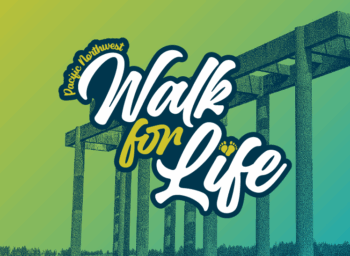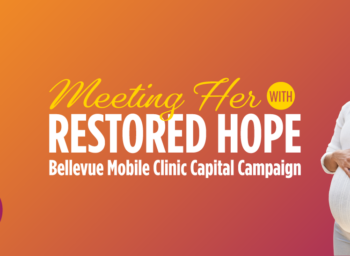Pregnancy and Infant Loss
In a world which frequently celebrates new beginnings and the joys of parenthood, a somber and often overlooked reality exists – pregnancy and infant loss.
1 out of every 4 pregnancies ends in miscarriage and 1 in every 175 pregnancies ends in stillbirth.
The month of October (globally recognized as Pregnancy and Infant Loss Awareness Month) is an opportunity to recognize the grief of these losses and a poignant reminder that the journey into parenthood is often filled with sorrow and grief.
During this awareness month, we at Care Net of Puget Sound acknowledge the pain many endure in silence.
What is considered pregnancy and infant loss?
Pregnancy and infant loss encompass a variety of experiences, from miscarriage and stillbirth to neonatal death.
A miscarriage is usually defined as the loss of a baby before the 20th week of pregnancy and can include ectopic pregnancies. A stillbirth is the loss of a baby at about 4 and a half months of pregnancy and later. Although each story is unique, grieving women share the pain of dreams shattered and a forever-altered future.
After experiencing a pregnancy or infant loss, many women experience a wide variety of mixed emotions. Some may experience…
- Guilt over what they think they should or should not have done
- Jealousy of others who have children
- Anger over circumstances outside their control
- Loneliness and isolation
How can I support someone who just experienced a loss?
Each one of us knows someone impacted by pregnancy or infant loss, whether a sister, friend, coworker or other acquaintance. Often, it’s hard to know how to support women who’ve experienced a loss. While each woman’s grief journey is different, here are a few practical ways you might consider supporting someone you know who has experienced a loss.
- Let them talk about their loss, even if they repeat themselves. They need to verbalize their pain.
- Be sensitive to any spiritual struggles they face. Doubt and anger with God are common responses.
- Offer to do something for them rather than asking them what they need. They can’t always quantify their needs because of their pain. You could bring them a meal, send them flowers, watch older children, bring them coffee, etc.
- Remember the day their child died and the due date, if possible. These dates are forever etched in their hearts and minds. Remembering these dates helps them know their children have not been forgotten.
Breaking the Silence
Many times, women who’ve experienced pregnancy or infant loss aren’t given a space to grieve and remember their child. Maybe they didn’t get a funeral. Maybe they’ve believed the lie that they don’t deserve to grieve because they were early in their pregnancy. Maybe they fear being hurt by insensitive comments from friends or family.
Pregnancy and Infant Loss Awareness Month is an opportunity to break the silence and stigma surrounding these types of losses and offer practical and emotional support to women who are grieving.
Find Support at Healing Tide
Care Net of Puget Sound offers free, safe and confidential support to women grieving a pregnancy and/or infant loss through our Healing Tide program. Through one-on-one support, weekend retreats, and weekly group support, women are given a space to grieve, remember, and honor their child(ren). Support is available online or in person so each woman can choose what is most comfortable for her.
Through our groups and retreats, women can connect with other women who understand the heartache of an empty cradle and can grieve and commemorate children lost to miscarriage, stillbirth, or infant death together.
A former participant of our Healing Tide program wrote that until she joined a Healing Tide group she, “hadn’t had the freedom to talk about my miscarriage with my friends. I often held back because of my shame and fear.”
Learn more about our Healing Tide support by clicking here or sending us a private message at healingtide@carenetps.org.
Pregnancy and Infant Loss Awareness Month is a reminder to all of us to approach this sensitive topic with compassion, empathy, and a willingness to listen. By acknowledging this pain and supporting those who have suffered such a devastating loss, we can help ensure that their babies are never forgotten, and that healing becomes possible, one step at a time.
Click here to learn more about the support available through Healing Tide.



